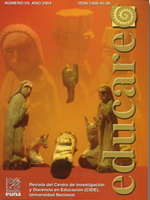Capitalismo global y cambio educativo. Los fundamentos estructurales e ideológicos de la política educativa neoliberal
DOI:
https://doi.org/10.15359/ree.2004-7.1Abstract
The reconfiguration of the social and political hegemony of the capital consolidated with the union of the New Right (neoliberals and neoconservatives) was a reaction against the crisis of capital accumulation that took place during the early 1970´s. The strategic objetives the this hegemonic block were basically the re-establishment of globalized capitalism and the establishment of a neoliberal political and cultural hegemony.
This essay provides an hermeneutic approach to show that the irruption of educational discourse and the neoliberal education policy are essential elements of the political and economical program promoted by the New Right as a way to face the following structural changes: the regulated crisis of capitalist accumulation that began in 1973; the crisis of legitimation and rationality of the State of contentment; the dismantling of the Keynesian pact and the sociodemocrat agreement in postwar education; the economical restructuring opposite to the acumulation crisis; the imperatives of configuration, introduction and legitimation of the new social structure of global capitalist accumulation and the consolidation of neoliberalism`s hegemonic culture.
References
Amín, S. (1999). El capitalismo en la era de la globalización. Barcelona, Paidós.
Apple, M.W. (1996). Politica cultural y educación. Madrid, Ediciones Morata.
Apple, M.W. (2000). Teoría crítica y educación. Madrid, Ediciones Morata.
Bobbio, N. (1998). Derecha e izquierda. Madrid, Taurus.
Carnoy, M. (1985). La educación como imperialismo cultural. México, Siglo XXI.
Eccleshall, R. (1993). "Conservadurismo", en VV.AA .. Ideologías políticas.Barcelona, Paidós.
Femández Durán, R. (2001). "Capitalismo global, resistencias sociales y estrategias de poder", en VV.AA. (2001). Globalización capitalista. Luchas y resistencias. Barcelona, VIRUS Editorial.
Femández Enguita, M. (1985). Trabajo, escuela e ideología. Madrid, Akal.
García, E. (1991). "Reforma escolar, acumulación, legitimación y Estado del bienestar", en VV.AA. Sociedad, cultura y educación. Madrid, CIDE-Universidad Complutense de Madrid.
Goodwin, B. (1997). El uso de las ideas políticas. Barcelona, Ediciones
Península.
Gramsci, A. (1985). La alternativa pedagógica. Barcelona, Hogar del libro.
Habermas, J. (1999). Problemas de legitimación en el capitalismo tardío. Madrid, Ediciones Cátedra.
Laval, C. (2004). La escuela no es una empresa. Barcelona, Paidós.
MacPherson, C.B. (1970). La teoría política del individualismo posesivo. Barcelona, Fontanella.
Mandel, E. (1986). Las ondas largas del desarrollo capitalista. Madrid,
Siglo XXI.
Moral Santín, J.A. y Raimond, H. (1986). La acumulación de capital y su crisis. Madrid, Akal.
Miranda Camacho, G. (2001). "La enseñanza comprensiva y el trasfondo sociopolítico de la crítica neoliberal", en VV.AA (2001). Por una educación ciudadana. INETEMAS, Instituto de Estudios Transnacionales de Córdoba, España, Año VIII, Nº 21, septiembre de 2002.
Navarro, V. (2000). Globalización económica, poder político y Estado del bienestar. Barcelona, Editorial Ariel.
Off e, C. ( 1990). Las contradicciones del Estado del bienestar. Madrid, Alianza Universidad.
Pérez Gómez, A. (1999). La cultura escolar en la sociedad neo/ibera!.
Madrid, Ediciones Morata.
Riutort Serra, B. (2001). Razón política, globalización y modernidad compleja. España, El viejo Topo.
Sharp, R. (1988). Conocimiento, ideología y política educativa. Madrid, Akal.
Touraine, A. (1993). Crítica de la modernidad. Madrid, Temas de hoy.
Published
How to Cite
Issue
Section
License
1. In case the submitted paper is accepted for publication, the author(s) FREELY, COSTLESS, EXCLUSIVELY AND FOR AN INDEFINITE TERM transfer copyrights and patrimonial rights to Universidad Nacional (UNA, Costa Rica). For more details check the Originality Statement and Copyright Transfer Agreement
2. REUTILIZATION RIGHTS: UNA authorizes authors to use, for any purpose (among them selfarchiving or autoarchiving) and to publish in the Internet in any electronic site, the paper´'s final version, both approved and published (post print), as long as it is done with a non commercial purpose, does not generate derivates without previous consentment and recognizes both publisher's name and authorship.
3. The submission and possible publication of the paper in the Educare Electronic Journal is ruled by the Journal’s editorial policies, the institutional rules of Universidad Nacional and the laws of the Republic of Costa Rica. Additionally, any possible difference of opinion or future dispute shall be settled in accordance with the mechanisms of Alternative Dispute Resolution and the Costa Rican Jurisdiction.
4. In all cases, it is understood that the opinions issued are those of the authors and do not necessarily reflect the position and opinion of Educare, CIDE or Universidad Nacional, Costa Rica. It is also understood that, in the exercise of academic freedom, the authors have carried out a rogorous scientific-academic process of research, reflection and argumentation thar lays within the thematic scope of interest of the Journal.
5. The papers published by Educare Electronic Journal use a Creative Commons License:














 The articles published by Educare Electronic Journal can be shared with a Creative Commons License:
The articles published by Educare Electronic Journal can be shared with a Creative Commons License: 



